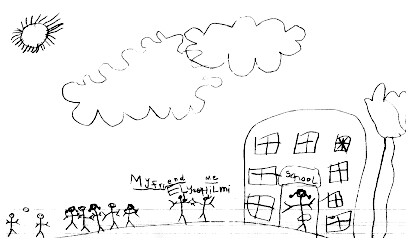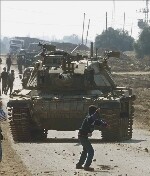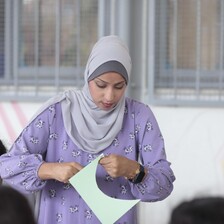‘I want to go to school and play with my friends. We cannot get our of our homes. We cannot buy books. We cannot play. The summer holiday is finished and we spent it all locked up in our homes under Israeli curfew’, writes 10-years old Nabih, who is a seventh grade student.
Hilmi is six years old. He wants to go to school. He drew his teacher, his friend Elyas and his classmates at school.

‘My friend Elyas, me Hilmi’
Since June 21, Nablus has been continuously under curfew. With an admirable will and determination to finish their high school, ‘Tawjihi’ (highschool) students had to face Israeli tanks and break the curfew to attend their final exams.
The academic year 2001/2002 ended two weeks before the occupier’s latest invasion of Nablus. Despite frustrations, stress, fear, sadness and anger that filled their minds and souls, following the occupier’s April invasion, the students managed to finish their academic year. They thought that their nightmare was over and they dreamt of a peaceful summer vacation, followed by a new normal academic year.

Faris Odeh, who was shot in the neck by Israeli occupiers and left to bleed to death, on November 9, 2000.
In an attempt to bring enlightment for the second part of their children’s dream, families in various neighborhoods in Nablus have set up classes for every school level. Volunteers teach groups of students in each neighborhood. Some families offered accomodation, garages and empty rooms, turned into classrooms.
Each student brings a chair from home to sit on. Money was collected to buy black boards, pens and books. However, this can never replace proper teaching in schools.
There aren’t enough books. Not all volunteers have experience in teaching. There are no playgrounds, nor teaching equipment. Moreover, parents, children and volunteers take a high risk setting this up under curfew. Two days ago, the occupier tear gassed a school where alternative education was taking place.
Salma (8) and her sister Zbaideh (7) wrote: ‘All students around the world sleep early every night to go to school in the morning. But me, my sister and all my friends here in Nablus don’t. Why? Because tanks are all over the streets of my town. Curfew has been imposed on us. We are all locked up at home. I miss my school, my classroom, my teachers and friends. I miss my uniform and my schoolbag. I am telling all the students in the world that they are lucky. Every morning, when you go to school, please remember that Salma and Zbaideh are at home, not allowed to go to school and learn’.
Although time is running out, children in Nablus believe that time hasn’t ran out from them. They still could start a proper academic year in their schools and classrooms, at their own desks, beside their own friends, and under the supervision of their experienced teachers.
Tarab is twelve years old. She is a seventh grade student. She wrote: ‘I really want to go to school. I miss my friends and teachers and I want to learn. Time is passing quickly and I don’t want to loose a year. I learn and study a few things at home. My mother and my neighbor teach me, but it is not enough for us. We don’t have our books from school yet. I wish the curfew will end very soon. I want to see my cousins and uncles and my grandparents. I miss them very much. I want to play outside my home, without being afraid that soldiers can see us, or that tanks will come to our street. I want to go to the shops and visit my friends, like I used to do. I counted the hours that the curfew was lifted, 70. During those hours I was never able to see any of my friends. Everybody ran to do their shopping or visit a doctor. Every night, I go to bed hoping that the curfew will be lifted the next morning. I wake up to find it is still on. I am very bored at home’.
The children in Nablus are determined to translate the second part of their dream into reality. In their appeals, they touch humanity and expect a helping hand to open their schools. The children in Nablus are raising their voices, hoping that there are people who care and listen and act upon their needs.
Yousef is six years old and a first grade student. He said that he lives in Nablus under curfew. He writes: ‘I want to go to school but it seems that few in the world care. I bought a schoolbag with my friends. Pens and pencils and a bottle of glue. Going to school with the children of the world is all I want to do. Get the soldiers out of my town, I want to live too’.





